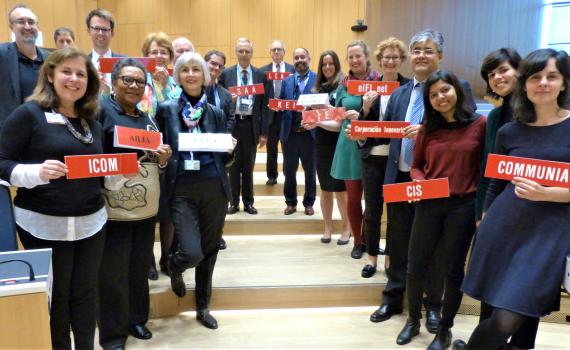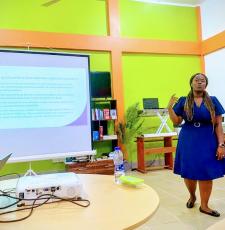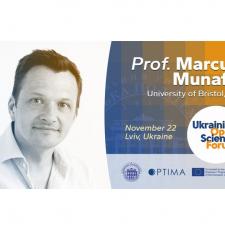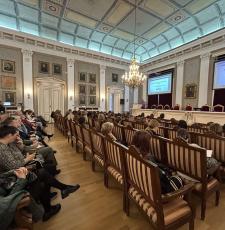
Teresa Hackett, EIFL Copyright and Libraries Programme Manager, attended the 37th meeting of the WIPO Standing Committee on Copyright and Related Rights (SCCR), the global body that sets international copyright law and policy, that took place in Geneva from 26 - 30 November 2018. During a full week advocating for libraries, EIFL participated in discussions on copyright limitations and exceptions, gave presentations at two civil society organized events, and engaged with government delegates from EIFL partner countries on library issues.
At the last SCCR of 2018, the main focus for libraries was on activities in the WIPO action plan 2018-2019; civil society presented ideas for the upcoming regional seminars on limitations and exceptions, as well as views on how to fix the draft broadcast treaty.
New analysis on limitations and exceptions
Discussion on limitations and exceptions (L&Es) for libraries, archives and museums (LAMs), and on education and research focused on progress of activities in the action plan adopted by member states at the last session (SCCR/36/7).
One key activity in the action plan that concerns both sectors (LAMs and education and research) is the typology (or classification) that analyses L&Es to create a better understanding of the detail of provisions, and of what is currently possible in national law. In this way, policy choices can come to the fore.
Prof Kenneth Crews, who delivered the first edition of the WIPO study on L&Es for libraries and archives over a decade ago, presented a preliminary version of the analysis that is being undertaken together with Prof Daniel Seng, author of the WIPO study on L&Es for education and research. The typology draws on the Crews and Seng studies, presenting the data in a systematic way to help identify and establish building blocks for new law-making, either individually or collectively.
On museums, Dr Yaniv Benhamou presented a report on copyright practices and challenges of museums, based on interviews with 37 museums worldwide.
Both presentations were followed by an informative, interactive Q&A session with member states and NGOs.
Towards regional seminars for LAMs and education
The LAMs and education and research communities are looking forward to a series of events that will take place in 2019. First, seminars on limitations and exceptions will be held in three regions - Latin-America, Africa and Asia-Pacific - in the first half of 2019 (locations and dates expected soon). Then an international conference will take place in Geneva, scheduled for 17-18 October 2019, just before SCCR/39.
At SCCR meetings over the past decade, libraries and archives have consistently presented evidence and examples of how copyright acts as a barrier to library services and activities, especially in the global digital environment. A comparison of the 2017 and 2015 editions of Prof Crews’ study on limitations and exceptions for libraries and archives showed that at the current pace of change it will take another 70 years, until 2087, for the laws of every country just to catch up with basic activities of libraries and archives today. That’s why support is needed from international law-makers.
Libraries appreciate the extensive and substantive work over the last 10 years at SCCR towards minimum, mandatory limitations and exceptions, and support from many member states for libraries.
The regional seminars provide a great opportunity to discuss the products of SCCR work, to learn about practical issues on the ground in particular cross-border information exchange, and to test ideas and proposals with regional stakeholders. The international conference is an opportunity to review findings and identify issues from the regions, and to consider international solutions to support libraries providing information services where ever they are in the world.
CONCRETE IDEAS FOR REGIONAL DISCUSSIONS
At a side event ‘Toward Action with Respect to the Limitations and Exceptions Regime: Looking Forward to SCCR Regional Seminars’, organized by the American University Program on Information Justice and Intellectual Property, EIFL introduced a decade of work towards minimum, mandatory exceptions at SCCR.
Two new documents were presented by civil society to assist regional discussions: model provisions for a text-based instrument on education - Treaty on Education and Research Activities (TERA) - and principles on copyright exceptions for LAMs. The documents draw on evidence from the WIPO studies as well as recent, relevant developments in national laws. The idea is to provide concrete ideas for regional discussions in support of the 2012 mandate of the WIPO Assemblies (to continue discussion towards an appropriate international legal instrument for libraries, archives, museums, and education).
“We can’t assume global goodwill”, said Rina Pantalony of the International Council of Museums, a panelist at the side event. In the context of the recent disastrous fire at the National Museum of Brazil, “we need a foundation that allows us to undertake a preservation operation to bring together the body of research that exists throughout the world with curators in other institutions on what the collection was about, to let it continue existing at least in spirit,” continued Pantalony.
Fixing the proposed broadcast treaty
At another side event organized by Knowledge Ecology International, ‘Civil Society Views on the proposed WIPO Treaty for the Protection of Broadcasting Organizations’, various civil society groups presented their views on the proposed new treaty.
EIFL set out the key concerns for libraries. Unless the proposed treaty has robust mandatory user rights, it will become more difficult for libraries to clear rights to show TV documentaries and live broadcast events, for example, and it will be more costly because libraries and other publicly funded institutions will have to pay for the privilege. As a result, access to broadcast material in libraries for uses such as research and study, civic education and community information will be reduced.
A WIPO treaty for the protection of broadcast organizations has been discussed at WIPO since 1996. The treaty sets out to update international rules to protect broadcast organizations against theft of their broadcast signal by creating a new related (or neighbouring) right to copyright.
Read more: WIPO Draft Broadcasting Treaty: NGO Views On What To Keep, What To Change.
Next steps
The year 2019 will be busy and exciting! EIFL is looking forward to learning from the experiences of regional stakeholders that will enrich global discussions in Geneva, and to working with our partners and allies in 2019 to achieve the best results for libraries, archives, museums and education.
The next session of SCCR (SCCR/38) takes place in Geneva on 1-5 April 2019.
Find out more
- Standing Committee on Copyright and Related Rights Thirty-Seventh Session: Meeting documents
- Statements by EIFL at SCCR/37.
- Video on demand SCCR/36. From the dropdown list, select Standing Committee on Copyright and Related Rights: Thirty-Seventh session
- Twitter hashtag #sccr37, #Copyright4Libraries
- WIPO SCCR/37 photo album on Flickr
Background, EIFL Copyright and Libraries Programme - Why EIFL is advocating for an international treaty for libraries and archives.
SHARE / PRINT









